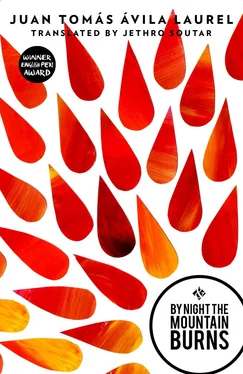Juan Ávila Laurel - By Night the Mountain Burns
Здесь есть возможность читать онлайн «Juan Ávila Laurel - By Night the Mountain Burns» весь текст электронной книги совершенно бесплатно (целиком полную версию без сокращений). В некоторых случаях можно слушать аудио, скачать через торрент в формате fb2 и присутствует краткое содержание. Год выпуска: 2014, Издательство: And Other Stories Publishing, Жанр: Современная проза, на английском языке. Описание произведения, (предисловие) а так же отзывы посетителей доступны на портале библиотеки ЛибКат.
- Название:By Night the Mountain Burns
- Автор:
- Издательство:And Other Stories Publishing
- Жанр:
- Год:2014
- ISBN:нет данных
- Рейтинг книги:5 / 5. Голосов: 1
-
Избранное:Добавить в избранное
- Отзывы:
-
Ваша оценка:
- 100
- 1
- 2
- 3
- 4
- 5
By Night the Mountain Burns: краткое содержание, описание и аннотация
Предлагаем к чтению аннотацию, описание, краткое содержание или предисловие (зависит от того, что написал сам автор книги «By Night the Mountain Burns»). Если вы не нашли необходимую информацию о книге — напишите в комментариях, мы постараемся отыскать её.
By Night the Mountain Burns — читать онлайн бесплатно полную книгу (весь текст) целиком
Ниже представлен текст книги, разбитый по страницам. Система сохранения места последней прочитанной страницы, позволяет с удобством читать онлайн бесплатно книгу «By Night the Mountain Burns», без необходимости каждый раз заново искать на чём Вы остановились. Поставьте закладку, и сможете в любой момент перейти на страницу, на которой закончили чтение.
Интервал:
Закладка:
Time passed, the tide came in and went back out, big fish were caught, octopus was eaten. There were rains and storms, the sun rose and set, and when it rose once more the woman’s pregnancy had grown big enough for all to see, the woman who’d talked to the sailors from the friendly nation. By the way, does anyone know why we say that boat belonged to a friendly nation? For it certainly wasn’t the only nation whose boats came to take our fish. Boats from many different places came to our waters, our shores, but when our men saw them and took to the sea to go and ask them for a handout, the sailors of those boats must have thought the people in the flimsy canoes were going to accuse them of stealing, for they quickly hauled in their nets, wound in their reels and disappeared over the horizon. Isn’t that disgraceful? They made it obvious that they were thieves, and what’s more, thieves who couldn’t care less about us, every man for himself, each to his own suffering. Sometimes the boats from nations we didn’t know even waited until our canoes were right up beside their boats and then they fired jets of dirty water, or hot water, at our men, to show us they were prepared to play ugly. They tried to sink our canoes, or maybe poison our men with toxic water. Gracias a Dios , our canoes didn’t sink. They capsized, but thankfully all the men on our Atlantic Ocean island can swim, although there was no one to teach us in our house. The arrival of these boats on our shores was fairly frequent and so we soon learned to differentiate the friendly nation’s flag from the flags of other nations. There were all kinds of flags: three bright horizontal stripes, one of them blue; three vertical stripes, one of them black; a single dark colour with a white sun in the middle; a single dark colour with a picture of something curved, the colour of mango. No one knew what nation this last flag belonged to, but it had, along with one of the tricolours, the fastest engine driver: as soon as a canoe left our shore, the boat set off at full pelt, as if the driver had heard there were witches on our island that had to be avoided at all costs.
Do you know what colour the friendly nation’s flag was? I doubt the woman who dealt with the sailors on the boat knew. Back then, the women who were old enough to go and talk to the sailors didn’t know much about the flags of nations. Did the woman even know for sure which sailor she’d had the liaison with when she fell pregnant? She wouldn’t have recognised the flag and I doubt she’d have recognised the sailor. For one thing, white people all look alike, even those who live under different flags, never mind those who live under the same one.
Coloured flags, men who had to be liaised with, women who were taken out to the boat of the friendly nation by other men. Flags that had to be distinguished beforehand, paddles put at rest if the boat with its nets cast was from a nation that liked to play ugly. If the men on our island had trouble recognising the flags, how could the women be expected to recognise them? As I’ve already said, the women didn’t know the flags and it’s unlikely they’d ever even noticed them. And that’s because in order to see them you had to be quite close to the boats, those thieving boats, friendly or otherwise. But the women on our island went about on foot until the need arose to go somewhere by canoe, when they would find a man to transport them. But even then, they would sit in the canoe facing the man doing the paddling, the canoeman they’d asked to take them wherever they needed to go. So to get to the meeting with the men on the boat, the canoemen paddled with their backs to the little village, meaning the women sat with their backs to the horizon and, with their backs turned, they wouldn’t have seen the flag of the nation of the men they were about to reach an understanding with, in order to help ease the desperate situation the island found itself in. And once the canoe was moored at the side of the boat, you could no longer see the flag. The women therefore liaised with the men oblivious to their nation or flag. Gracias a Dios, those boats were from a friendly nation and didn’t flee as soon as our canoes took to the water.
The pregnancy grew and that woman gave birth to a pretty little child they wrapped in rags, for by then there was nothing left of what had been brought back from the boat. And nobody had known at the time that visiting the boat would result in the birth of a child who’d require clean clothes. Anyway, the baby was born. Time passed and by now those white men knew when our waters were most full of fish and so they came back the following season, after a particular length of time had passed. They came back in the same boat, with the same name painted on the back and the same flag, but with different people who answered to different names. For example, the one who might have been the father of the newborn child didn’t come. However, I doubt that woman could have pointed to any one man and said he was the father of that pretty child. Unless something had happened on the boat and only one man … No, there was no way of telling; she wouldn’t be able to tell.
They cast out their nets, which is why they’d come, stole our fish and then looked to the shore, and when they saw us coming in our canoes they were pleased to see us. And they listened to the story of the white child being born in our big village, and they held their hands up and said no, the child’s father was not with them, but yes, they ought to do something for the boy, who was still then only a baby. And so they gave us fish, they gave us salt, soap, matches, cigarettes, clothing for the baby boy and for other children, kerosene to light our houses on dark nights and many different types of things to eat, for they had lots of food on the boat to keep them going for several months away from home, away from their nation. They also gave us fish hooks and nylon, which we’d really struggled without since the boat from the place where our fathers were had stopped coming to the island. And they held the boy in their hands and they danced with him gleefully and they said he reminded them of the father, who could not, for whatever reason, be with them. And, because he reminded them of the father, they said that child of theirs should be called Luis Mari.
They came ashore and visited the house where their boy lived, met all his brothers and sisters, and realised they probably ought to do more for him. But they had a busy job sailing the seas and stealing other people’s fish, and they couldn’t afford to worry too much about a boy growing up without a specific father, for who knows what really happened out on that boat. So the sailors from the boat with the flag of the friendly nation decided their duty was done and they bid us farewell, their boat’s store-rooms overflowing with fish taken from our waters. The men from the island who went out to the boat saw this for themselves. Goodbye Atlantic Ocean island, goodbye Luis Mari. Goodbye sister-in-law. We’ll be back to steal your fish again at a particular time in the future, and we hope to find the boy has grown and the mother is well. But given what we’ve just seen, it wouldn’t surprise us at all if we came back and were told the boy had gone to fill his place in the cemetery, which incidentally doesn’t seem to have too many places left. You really do have a large cemetery for an island of so few inhabitants. Bye.
Months passed and everything returned to the way it had been before. Those inhabitants who weren’t so well connected to the white men from the boat went back to living with outstretched hands. The first thing to run out was the tobacco, the island’s supply of cigarettes. Men were soon forced to return to old ways, smoking papaya leaves, or else they wandered the streets with bundles of fish in search of a cigarette or half a tobacco leaf. Women kept tobacco stored away like gold, real gold, and they called their tobacco leaves their ‘husband’. Tobacco became the husband of any woman who didn’t have a flesh-and-bone husband. Tobacco in all its forms, including snuff. The women pounded tobacco into snuff and added the powder of a stone only known to people who liked sniffing it. I’ve already said how some older women stuffed tobacco in their gums, which I never understood, but that wasn’t why tobacco became a woman’s husband. Tobacco was like a husband because it enabled single women to get things they usually needed a man for. They kept their tobacco in a strongbox and turned to it whenever the need arose. And when a man yearned for tobacco more than he yearned for anything else, he took to the streets with his fishing bundle and offered fish in exchange for tobacco, doing so with the following cry: ‘Fish, tobacco! Fish, tobacco!’ If he needed palm oil, it was: ‘Fish, palm oil! Fish, palm oil!’ If a single woman had a ‘husband’ in a strongbox, she could do deals to satisfy her needs: if she needed a man to clear a plot of land she wanted to plant on, if she needed a canoeman to transport her and her children to the settlements, if she needed a tapper to give her a pot of palm wine to take to a Misa for the dead, etc, etc … I speak only of the needs a woman might satisfy by keeping her ‘husband’ safe in a strongbox. Tobacco was a sort of life insurance to them. Even so, the time inevitably came when there was no longer a scrap of tobacco anywhere on the island. And the men, driven on by their craving, made their bundles larger, the fish in their offerings more colourful, and they headed out into the street with the same cry on their lips: ‘Fish, tobacco! Fish, tobacco!’ And they covered every street, the entire village, and found nothing. All that was left in the strongbox was the smell, a smell that lingered in the houses, clinging to clothes hung up for some special occasion. ‘Ahhh!’ sighed the smokers as they breathed in the air from the strongbox, trying to satisfy their craving with the smell.
Читать дальшеИнтервал:
Закладка:
Похожие книги на «By Night the Mountain Burns»
Представляем Вашему вниманию похожие книги на «By Night the Mountain Burns» списком для выбора. Мы отобрали схожую по названию и смыслу литературу в надежде предоставить читателям больше вариантов отыскать новые, интересные, ещё непрочитанные произведения.
Обсуждение, отзывы о книге «By Night the Mountain Burns» и просто собственные мнения читателей. Оставьте ваши комментарии, напишите, что Вы думаете о произведении, его смысле или главных героях. Укажите что конкретно понравилось, а что нет, и почему Вы так считаете.












